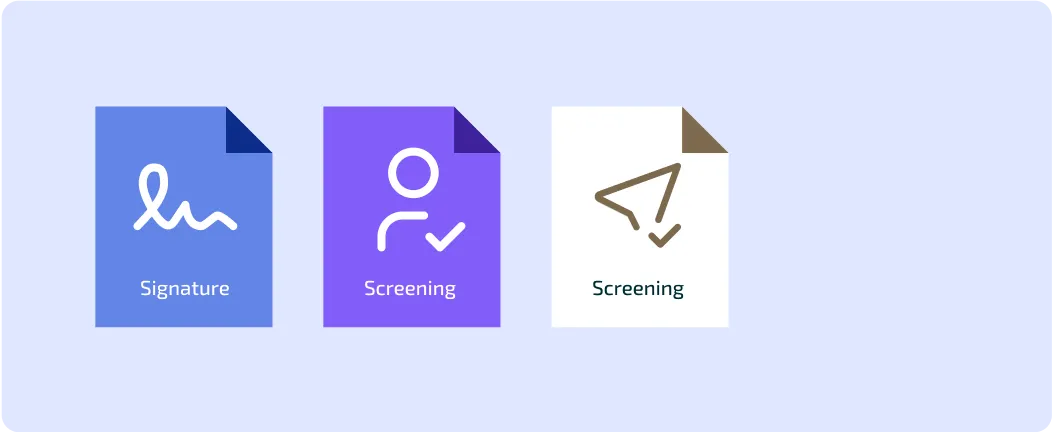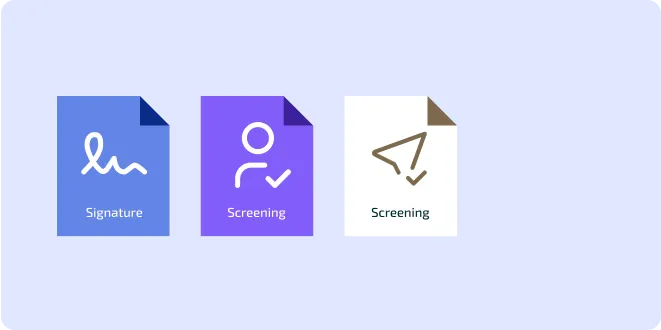.webp)
Published on
July 28, 2024
Your Guide to KYC Onboarding Process and AML Requirements
In this story

Comply quickly with local/global regulations with 80% less setup time
.svg)
.svg)
Welcome to the world of KYC onboarding. The KYC onboarding process is crucial in building a secure and trustworthy relationship with your clients.
This guide will explain the KYC onboarding process, explore its necessity, delve into regulatory requirements, and provide valuable insights on optimizing customer onboarding. As the gateway to establishing credibility, the KYC onboarding process ensures that businesses comply with regulatory standards and foster a foundation of trust with their clients.
What is the KYC Onboarding Process?
KYC, or Know Your Customer onboarding process is the gateway to establishing a secure relationship with clients. The KYC onboarding process involves collecting and verifying customer information to ensure compliance with regulatory standards and mitigate risks.
A legal requirement for all financial institutions, KYC prevents money laundering, terrorism financing, and financial crimes. It's a comprehensive process to verify customer identities, protecting businesses from fraud and cyber threats.
Read more: How Does Money Laundering Work? A Complete Guide for AML Compliance
Why Do You Need a KYC Checklist?
This checklist isn't just a set of boxes to tick; it's your roadmap to building trust and complying with regulatory standards.
1. Navigating Compliance:
A KYC checklist ensures that your business adheres to regulatory requirements. From verifying the identity of customers to assessing potential risks, each item on the checklist plays a crucial role in maintaining compliance with Anti-Money Laundering (AML) and other regulations.
2. Building Trust:
Trust is the cornerstone of any successful business relationship. A comprehensive KYC checklist helps you gather and verify essential customer information, instilling confidence and reliability from the beginning. It's not just about meeting legal standards but about showing commitment to transparency and security.
3. Efficiency in Onboarding:
Efficiency is key in today's fast-paced business world. A well-structured KYC checklist streamlines the onboarding process. Collecting necessary information upfront eliminates delays and ensures a swift, hassle-free experience for your customers.
4. Risk Mitigation:
Identifying and assessing risks is a fundamental aspect of the KYC process. A detailed checklist allows you to evaluate the potential risks associated with each customer, helping you make informed decisions and safeguard your business against financial crimes.
5. Adaptability to Industry Changes:
The regulatory landscape is dynamic, and compliance requirements evolve. A KYC checklist keeps your onboarding process adaptable. Regular updates to the checklist ensure that your business stays ahead of regulatory changes, reducing the risk of non-compliance.
Read more: What Is a KYC Document? Why Is It Necessary?
Comply quickly with local/global regulations with 80% less setup time
.svg)
.svg)
Top 7 Benefits of the KYC Onboarding Process
The KYC onboarding process is your golden ticket to a faster, more efficient onboarding experience that leaves both you and your clients smiling.
1. The Need for Speed: Faster, Efficient Onboarding
Picture this: You've got all the right information upfront. Bam! Your onboarding process becomes a speed demon. No more waiting around – approvals are quicker, and your client applications are sailing through, thanks to the power of collecting the right kind of data.
2. Red Flags Wave Early: Spotting Risks in Advance
With the right data in your arsenal, risk assessment becomes a superhero skill. Spotting red flags early means you're not just fighting financial crimes; you're winning. Whether it's fraud, money laundering, or suspicious behavior, you catch it way up the line.
3. Staying on the Right Side: Remaining Compliant
Collecting the right KYC data is your ticket to steering clear of legal and financial penalties. Plus, it shields you from reputational damage and the dreaded loss of customer trust. Compliance isn't just a checkbox; it's your armor.
4. Reputational Boost: Trust in Action
Early security checks aren't just for show; they scream trust. Prospective customers see a business that values safety, both theirs and yours. It's the kind of reputation that speaks volumes.
5. Smooth Sailing for Customer Satisfaction
Guess what clients love? A seamless onboarding process. It's like a VIP treatment that sets the tone for a lasting relationship. A smoother experience equals happier clients who are more likely to stick around. It's the small details that make a big difference.
6. Market Insight: Know Your Scene
The information gathered during KYC is for more than just the show. It's a goldmine for businesses wanting to understand their market. By cross-referencing applicant details, organizations get a backstage pass to market research.
7. Scaling Up: The Need for Speed on a Larger Scale
Efficient onboarding means you can welcome more clients into the fold swiftly.
Who Needs KYC During Onboarding?
Every business dealing with clients or customers needs KYC during onboarding. Whether you're a bank, fintech startup, or any service provider, KYC is your first line of defense against fraud and financial crimes.
Whether you're opening a new bank account, applying for a credit card, or joining a cryptocurrency exchange, KYC is a universal requirement. It's not just for financial giants; even the newest players in the market are embracing KYC to fortify their security measures.
Read more: AML Compliance for Fintechs: Safeguarding Innovation & Trust
KYC/AML Requirements for Customer Onboarding
When it comes to onboarding customers, understanding KYC/AML onboarding requirements is crucial. It's not just about ticking regulatory boxes; it's your first step in building client trust.
1. Understanding KYC/AML:
Know Your Customer and Anti-Money Laundering regulations go hand in hand. Complying with these standards is non-negotiable for a robust onboarding process.
2. Streamlined Verification:
Implement efficient processes for identity verification, document authentication, and risk assessment.
3. Ongoing Monitoring:
Regularly update customer profiles and monitor transactions to stay compliant with evolving regulations.
Understanding the Differences Between KYC and KYB Onboarding
Before diving deeper, let's clarify KYC vs. KYB. KYC focuses on individuals verifying their identity. On the other hand, KYB, or Know Your Business, ensures the legitimacy of companies entering the financial realm.
Understanding the differences between KYC and KYB onboarding is like deciphering the keys to a different door that opens to individual or corporate clientele. When it comes to navigating these distinct paths, it's crucial to recognize that KYC and KYB checks aren't cut from the same cloth. Let's unravel the nuances and shed light on what sets them apart.
KYB Onboarding Process
KYB (Know Your Business) onboarding is the gateway to welcoming corporate clients securely and compliantly. Unlike the simplicity of KYC for individuals, KYB delves into the intricacies of a corporation's financial landscape, capital sources, AML risk, and organizational structure. The journey involves gathering a comprehensive set of information:
1. Basic Information
Company details, VAT/GST number, and legal identity documents.
2. Organizational Structure
Identifying key personnel, legal representatives, and Ultimate Beneficiary Owners.
3. Banking Information
Scrutinizing financial statements, bank transactions, and monitoring for suspicious activities.
4. Risk Assessment
Evaluating business activities in various jurisdictions and conducting enhanced due diligence if needed.
5. AML Compliance
Adhering to AML onboarding policies through customer due diligence, ongoing monitoring, and reporting suspicious transactions.
Read more: AML Vs KYC: What is The Difference
KYC Onboarding Process
On the flip side, KYC (Know Your Customer) onboarding simplifies the process for individual clients. While it may seem less intricate compared to KYB, its importance remains paramount. The KYC onboarding process is the mandatory procedure for identifying and verifying an individual's identity, whether it's for opening a bank account or subscribing to financial services.
To identify you, businesses require minimum data. Here's what the KYC onboarding journey entails:
1. Identification Documents
Collecting and verifying government-issued documents like passports or ID cards.
2. Address Proof
Confirming the correctness of residential or business addresses through utility bills or bank statements.
3. Contact Information
Gathering phone numbers and email addresses for direct communication.
How to Improve Customer Onboarding (KYC) Process Flow
Now that we've explored the foundation, let's talk about optimizing the KYC onboarding process:
1. Streamlined Steps:
Simplify the onboarding process with clear and concise steps. Each stage should be user-friendly and efficient, from creating an account to document verification.
2. User-Focused Approach:
Place yourself in the shoes of the user. A seamless experience is not just a luxury; it's an expectation. The smoother the onboarding, the happier the customer.
3. Technology Integration:
Leverage cutting-edge technology to expedite the process. Artificial intelligence and biometric authentication are game-changers in ensuring accuracy and speed.
FOCAL: Your Partner in KYC Onboarding Excellence
FOCAL emerges as a strategic ally in the quest for a flawless KYC onboarding process. How can this innovative solution elevate your experience?
1. Advanced Automation:
FOCAL incorporates advanced automation to streamline KYC processes. From data collection to verification, expect efficiency at every turn.
2. Compliance Confidence:
Navigate the intricate web of KYC/AML regulations with confidence. FOCAL keeps you ahead of compliance changes, ensuring your KYC onboarding processes are always up to par.
3. User-Centric Design:
Designed with you in mind, FOCAL puts the user experience at the forefront. Intuitive interfaces and user-friendly features make onboarding a breeze.
Conclusion
Mastering the KYC process is paramount in the dynamic landscape of customer onboarding. Armed with knowledge, streamlined processes, and the support of tools like FOCAL, you can ensure a seamless and compliant onboarding experience for your clients.
FAQs
Q1. What sets KYB onboarding apart from KYC onboarding?
KYB (Know Your Business) focuses on understanding the business entities, while KYC (Know Your Customer) is centered around individual customers.
Q2. What are the primary phases involved in KYC?
Initiate the process, collect information, verify identity, assess risk, and perform ongoing monitoring
Q3. What guidelines should be followed in KYC onboarding?
Regulations vary by jurisdiction, but they generally involve compliance with KYC/AML standards set by financial authorities.
Q4. Why is the KYC onboarding process so crucial to businesses?
The KYC onboarding process is essential as AML obligations and industries mandate it focused on fraud prevention. It ensures a worthwhile and well-informed KYC process by verifying the identity of prospective customers and assessing their risk level.
This enhances the organization's ability to avoid dealing with illegitimate individuals and provides insights into customers' propensity for financial crimes, safeguarding operations, reputation, and return on investment. In essence, is KYC onboarding an act of customer due diligence and enhanced diligence for businesses? Absolutely. It not only protects against potential risks but also reduces the chances of friction and false positives leading to customer churn and insult rates.
Comply quickly with local/global regulations with 80% less setup time
.svg)
.svg)

How Aseel reduced onboarding time by more than 87% using FOCAL
Learn how FOCAL empowered Aseel to achieve new milestones.
.svg)
.svg)
Mastering Fraud Prevention: A Comprehensive Guide for KSA and MENA Businesses
51% of organizations fell victim to fraud in the last two years, don't be caught off guard, act proactively.
.svg)
.svg)
Featured blog posts





AI-Driven Precision in Fraud Risk and AML Compliance
.svg)
.svg)

.svg)
.png)




.svg)


.webp)


.webp)
.webp)


.svg)

%20(1).webp)
Comments
Leave a Reply
Comment policy: We love comments and appreciate the time that readers spend to share ideas and give feedback. However, all comments are manually moderated and those deemed to be spam or solely promotional will be deleted.